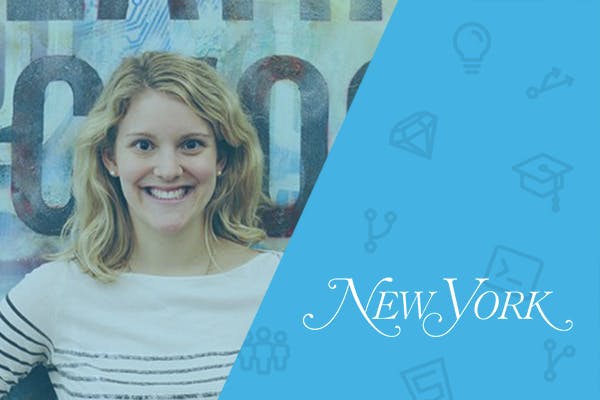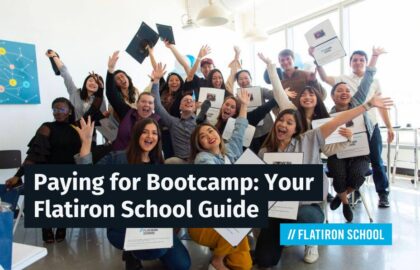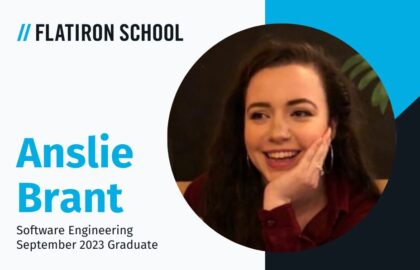In our Beyond the Bootcamp series, we chat with members of our alumni community about their career journeys. What new roles have they taken on since leaving Flatiron School? What advice do they have for new programmers following in their footsteps?
Victoria Thevenot graduated college as a “confused postgrad with a BA in English Literature.” After struggling to find work as an editorial assistant, she began to learn to code – at first to expand her skillset, and then because she found that she loved programming – and launched a career as a developer at the same publications that had previously passed her over. She’s now a Front-End Developer at New York magazine. Read on to see how she made the transition to tech while staying in an industry she’s passionate about.
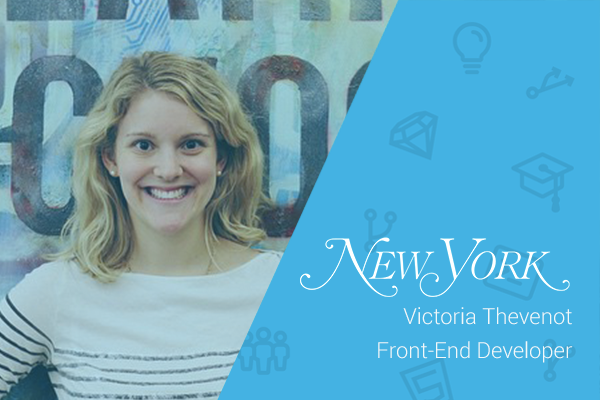
Learning to Code
Victoria first started learning to code to enhance her writing skills. “I wanted to work in editorial at a book publishing company or magazine,” she says. “When I moved to New York, I applied to about 75 editorial jobs and never got a single response.” She initially looked at coding as an additional skill to put on her resume – something that would allow her to say she doesn’t just write but also publishes and updates it. “And what I found through a very basic intro to HTML is that I actually love the coding more than the writing,” she says, “which is very, very strange for an English literature major.”
Victoria found that she had preconceived notions about what she thought a programmer was – and who she thought she was. “What I found when I started learning to code was that none of the things I thought to be true were true,” she says. “I’m not a math person and I haven’t taken a math class in ten years. But what I found about programming was that it’s inherently creative and a form of self-expression in a way I didn’t see before. When you’re doing front-end web work, you’re changing the fonts on pages, you’re styling things or moving content around, you’re adding images. You can very quickly see the creativity behind it.”
Takeaway #1 – Victoria’s top advice for new programmers is less about learning how to code and more about learning how to be a beginner. “One of the biggest hurdles for me when I started learning how to code was that I was very insecure about being a beginner again. It wasn’t that I was bad at programming. It’s just that I was brand new to it. It would be just like if I tried to paint a portrait or play piano – it’s not something you can just do after an hour of work. I had to really struggle to fix that mindset. You’re not bad at it; you’re not stupid. It’s just new.”
The Flatiron School Experience
Victoria joined Flatiron’s second-ever class – before coding bootcamps were even a thing let alone a whole industry. “There wasn’t really a track record. There was no jobs report. There were no reviews of schools online. It was new for everybody who was doing it,” she says. So what inspired Victoria to take the leap into this new form of education? “The passion of Adam and Avi, the two founders,” she says. “How much they deeply cared about their vision and the skillset they were providing to their students.”
For Victoria, the best part of attending Flatiron School was “being in a room with 27 other like-minded individuals who were all working together to make each other better and learn something new,” she says. “Spending all day until nine o’clock every night and beyond with a group of individuals makes you really close. Having that support system of Adam and Avi and my classmates was definitely a highlight.”
Takeaway #2 – The most important lesson that Victoria says she has carried with her since graduating four years ago: learning how to learn again. “I learned how to be really comfortable with something that’s brand new and say, ‘I don’t know what I’m doing but let’s read about it; let’s tinker with it; let’s figure it out.’ And in that, I learned how to be really comfortable with everything that I don’t know. And that’s carried into not just programming but situations like: my cable’s broken – how do I start to figure this? Or, I got a piece of IKEA furniture – which would normally make me feel like crying. I feel much more equipped to tackle things that are brand new to me or may seem difficult.”
Life at New York Magazine
Victoria works on New York magazine’s ads team “which means I’m dealing with every single ad that’s on our website,” she says,”and our ads account for more than 50 percent of the company’s revenue.” She splits her time between managing existing ads – fixing ones that break or are performing badly – and building tools to enhance new branded content (sponsored articles for brands). “For branded content, I’m given a spec sheet from designers for what exactly a page should look like, and I put all of those components together, build out animations, and build anything that we don’t already have working and functioning.”
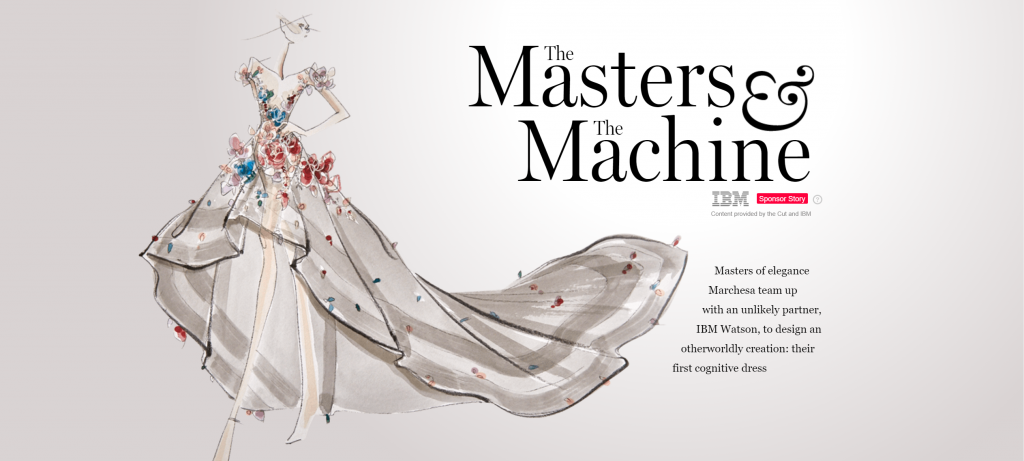
An example of New York's dynamic branded content.
So does Victoria still use her writing skills? You’d be surprised. “It’s been an asset to employers [first Time and now New York] that I actually care about their business and understand the magazine world,” she says. “I’ve also found that the communication skills that I picked up in my English lit degree have been immensely valuable in the way that I work with my team – especially the nontechnical members on my team. I was uniquely positioned to be able to explain things – deadlines, timelines and more – very clearly in a way they could understand.”
Takeaway #3 – Victoria notes that for bootcamp grads going after that first tech job, it can often feel like you’re the only one being interviewed. But according to Victoria, “It’s really important to remember that you are interviewing a company as much as they are interviewing you. So be prepared with really thoughtful questions.” When Victoria was interviewing, she asked about what she values in a work environment: their culture of collaboration. “Do developers pair together? Do they work together? Is there a budget for continuing education for conferences? How involved are the developers in the developer community?” So, what do you value?
What’s next for Victoria?
Victoria’s ultimate goal: to become the best developer she can be. “I don’t have clear long term goals that I want to end up as a CTO or with a specific title,” she explains. “For me, I’ve been excited about being in a position and working in an industry where I can continue to learn and grow, where there are always new technologies to learn. For me, it’s about making sure that I’m always in a position where I’m not bored, where I’m always stimulated and growing as a developer.”
Ready to start your own programming journey? The best way to get started is our free Bootcamp Prep course. Stay tuned for more installments of “Beyond the Bootcamp”!
